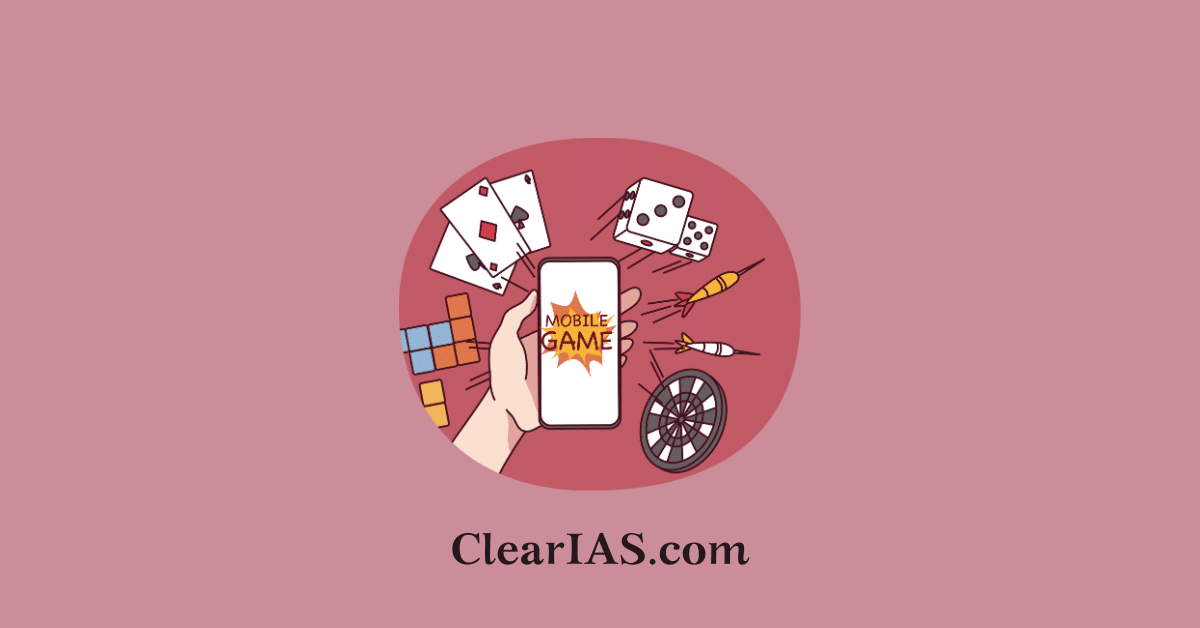
The new online gaming act 2025 is aimed at banning harmful money games while promoting e-sports and safe digital recreation. Read here to learn more.
India’s digital economy is one of the fastest-growing in the world, and the online gaming industry has emerged as a key contributor.
Yet, alongside its potential for innovation, skill development, and employment, the sector has also brought serious social and economic risks, particularly through online money gaming platforms.
Recognising this duality, the Government passed the Promotion and Regulation of Online Gaming Bill, 2025, on August 21, 2025.
Online Gaming Act 2025: Key Features
- Regulatory Authority
- Establishes the National Online Gaming Authority (NOGA) under the Ministry of Electronics & IT.
- NOGA will register and regulate online gaming platforms, frame standards for responsible gaming, and ensure consumer protection.
- Classification of Games
- E-Sports: Competitive, skill-based digital gaming with no monetary stakes. Treated as a legitimate sporting activity.
- Social/ Casual Gaming: Recreational, entertainment-based games without betting or wagering.
- Online Real Money Games (RMGs): Games where players stake money for the chance of winning real monetary rewards. This category faces the strictest regulation.
- Prohibition of Harmful Games
- Games involving wagering, betting, or chance-dominant outcomes are deemed “prohibited online games.”
- Addiction-inducing design features (dark patterns, manipulative reward loops) may also be restricted.
- Mandatory KYC & Age Verification
- Platforms must conduct Aadhaar-based KYC for players.
- Persons under 18 years cannot participate in RMGs.
- Advertising Restrictions
- Online RMG ads must carry addiction warnings (similar to tobacco disclaimers).
- Misleading claims like “easy money” or “assured winnings” are prohibited.
Penalties under the Act
- For Players
- Engaging with prohibited online money games: Fine up to ₹25,000 (first offence).
- Repeat offence: Imprisonment up to 6 months or fine up to ₹50,000, or both.
- For Platforms/Operators
- Running or advertising unlicensed/prohibited games: Imprisonment up to 3 years and a fine of up to ₹10 crore.
- Failure to conduct due diligence (KYC, addiction safeguards): Suspension/cancellation of license + monetary penalties.
- Taxation
- Mandatory deduction of TDS on winnings above ₹100.
- 28% GST continues to apply on RMG entry amounts (as per GST Council decision in 2023).
Why the Online Gaming Act Was Needed
The growth of online money games, where financial stakes are involved, has had devastating consequences:
- Addiction & Financial Ruin: Players often lose entire savings chasing illusory profits. According to government estimates, 45 crore Indians have been negatively affected, with losses exceeding ₹20,000 crore.
- Mental Health Crisis: Cases of depression and suicides linked to money gaming losses have been reported.
- Fraud & Money Laundering: Platforms have been misused for illegal activities, including terror financing.
- Legal Gaps: While offline gambling is already prohibited under the Bharatiya Nyaya Sanhita (2023) and various state laws, the online domain lacks clear regulation.
What has the World Health Organization (WHO) said about Real Money Games?
-
- Real money games pose a high risk of behavioural addiction, leading to financial distress, debt cycles, and mental health issues, especially among youth.
- WHO classified “gaming disorder” as a mental health condition in ICD-11, especially where real money stakes are involved.
- Countries are advised to regulate RMGs with strict age limits, spending caps, and advertising restrictions.
E-sports vs social gaming vs online money games
Category |
Definition |
Legal Treatment in Act |
E-Sports |
Competitive skill-based digital games (e.g., FIFA, Valorant tournaments) |
Promoted as part of India’s digital sports ecosystem; no monetary stakes |
Social Gaming |
Recreational, entertainment games (e.g., Ludo King, PUBG without money) |
Allowed freely, subject to basic safety guidelines |
Online Real Money Games (RMGs) |
Games where players stake money with potential monetary rewards (rummy, poker, fantasy leagues) |
Strictly regulated: licensing, KYC, tax deductions, addiction warnings; prohibited if chance-dominated |
Judicial Developments on Online Gaming
- Supreme Court Interventions
- The SC has upheld states’ powers to regulate or ban betting/gambling under Entry 34, List II (State List).
- However, with online RMGs crossing state boundaries, the SC in 2024 clubbed multiple petitions and noted the need for a uniform central law.
- It directed the Centre to bring clarity on what constitutes “skill vs chance” games. The new Act is a response to this judicial nudge.
- Skill vs Chance Debate
- SC in earlier cases (K.R. Lakshmanan v. State of Tamil Nadu, 1996) held that games of skill (like rummy, chess, fantasy sports) are distinct from gambling.
- The Act codifies this distinction, protecting e-sports and skill-based social games, while subjecting RMGs to stringent regulation.
Other Related Measures by the Government
The Act builds on existing laws and initiatives:
- IT Act, 2000 & IT Rules (2021, amended 2023): Blocking illegal websites; requiring registration of intermediaries.
- Bharatiya Nyaya Sanhita, 2023: Sections 111 & 112 penalise unlawful economic activities, betting, and gambling.
- GST Framework: Offshore gaming platforms brought under Simplified Registration Scheme.
- Consumer Protection Act, 2019: Ban on misleading advertisements and influencer endorsements.
- Advisories: Ministries of I&B and Education issued warnings and safe gaming guidelines.
- Cybercrime Reporting: Dedicated portal (cybercrime.gov.in) and helpline (1930).
Way Forward
The Online Gaming Act 2025 is not the end but the beginning of a more structured approach to India’s digital future.
- A clear insurance and compensation framework may be needed to cover unforeseen risks in e-sports and legitimate gaming.
- Strong international cooperation will be required to regulate offshore platforms.
- Ongoing awareness campaigns can help parents, schools, and communities guide safe digital habits.
By ensuring technology serves people and not the other way around, the Act aligns with India’s larger Digital India and Viksit Bharat 2047 vision.
Conclusion
The new Online Gaming Act 2025, creates a three-tiered regulatory framework distinguishing e-sports, social gaming, and RMGs, aligning with WHO warnings on addiction. It introduces strict penalties, mandatory KYC, and advertising restrictions for RMGs while promoting legitimate gaming and e-sports.






Leave a Reply